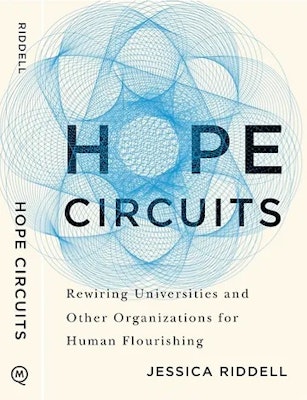Leadership Institutes for Women and Gender-Diverse Leaders
Keynote
Leading with Hope

Jessica Riddell
Stephen A. Jarislowsky Chair of Undergraduate Teaching Excellence at Bishop’s University
Jessica Riddell is a Full Professor of Early Modern Literature in the English Department at Bishop’s University (Quebec, Canada). She holds the Stephen A. Jarislowsky Chair of Undergraduate Teaching Excellence at Bishop’s University; in this capacity, she leads conversations about systems-change in higher education that shifts the focus from resilience to human flourishing. In her research, teaching, leadership, and administration, she participates in a wide range of interchanges at the national and international levels about how universities fulfil the social contract to a broader society.
An award-winning educator and scholar, she has published on Shakespeare, institutional culture change, inter-institutional collaborations, experiential learning, and inclusive high impact practices. Her recent book, with collaborators Lisa Dickson and Shannon Murray, is called Shakespeare's Guide to Life, Hope, and Learning (University of Toronto Press, 2023) and was nominated for the Gordon Book Prize. Her newest book, Hope Circuits: Rewiring Universities and other Systems for Human Flourishing (McGill-Queen’s University Press, 2024) offers a powerful critique of the fragmentation, weakening of purpose, and instrumental practices of higher education and an expansive call for the reinvention of universities and the renewal of their public mission.
Riddell is a leading intellectual on the intersection between the humanities and higher education. She is one of Canada’s most prolific public scholars on the role universities play in a civil, just society and regularly convenes conversations about how education shapes creative democracy. As an inter-disciplinary researcher, she’s engaged in knowledge creation in diverse fields from Shakespeare to transformative learning, inclusive high-impact practices to systems- and design thinking.
Riddell was awarded the William and Nancy Turner Award for Teaching Excellence (2011-2012) at Bishop’s University, received the 3M National Teaching Fellowship in 2015, was the recipient of a D2L Innovation Award for Teaching and Learning in 2022, and won the inaugural award from Forces Avenir (Quebec’s highest recognition in higher education) for Most Engaged Faculty/Staff Member in 2022.
Riddell has a robust leadership portfolio in higher education and serves on several boards, including the Board of Directors for AAC&U, the Research Advisory Board for Future Skills Centre, and has served on the 3M National Fellows Council and as VP Canada for the International Society for the Scholarship of Teaching and Learning.
More about Hope Circuits
Hope Circuits is a higher-education call-for-action as the sector undergoes an unprecedented paradigm shift. Drawing upon experience in governance, senior administration, and scholarship, the book helps readers develop the conceptual tools that will engender local, embodied, and embedded solutions to some of the academy's most pressing issues.
Hope Circuits invites all higher education stakeholders to expose, name, and reflect upon the complex problems ailing universities in Canada in the following areas: learning, teaching, mentorship, leadership, governance, research, valuing, measuring, and funding. The book does so through provocative stand-alone chapters that bring fresh eyes to longstanding higher-education challenges.
Perhaps more importantly, Hope Circuits aims to re-wire mindsets, perspectives, and behaviors, to, in turn, re-wire and renew the systems within which readers learn, live, and work. The book suggests ten conceptual tools to build "hope circuits": the conceptual tools are framed in the introduction and deployed throughout the book to rethink higher-education systems for the better by creatively putting university-design theory into practice.
Hope Circuits was created in conversation—through conversations, focus groups, and summits—and weaves together multiple voices to explore complex issues at human and humane scale through story-telling and reflection. This book asks its readers to sit in learner positions, to join the conversations, and to start new ones: because, at its heart, learning is a power that stretches the limits of our known knowledge and endeavors to peek over the edge into the unknown with wonder, curiosity, and purpose.
